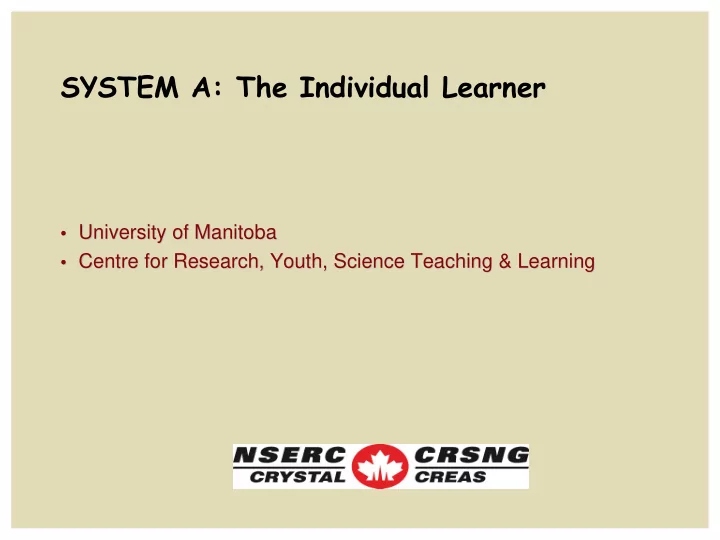

SYSTEM A: The Individual Learner • University of Manitoba University of Manitoba • • Centre for Research, Youth, Science Teaching & Learning Centre for Research, Youth, Science Teaching & Learning •
Associated Research Focus: How do attributes of the learner combine to impede, contribute to, and sustain personal science and mathematics success? Objectives: (1) to identify personal attribute factors that impede or support the learning of science and mathematics in formal school settings; (2) to identify the risk and protective factors that affect decisions to further study science and mathematics; (3) to identify the course trajectories of students in relation to demographic and achievement data as they progress through the school system.
Projects in System A • Linking Communities to Enhance Learning Opportunities in Science for both Teachers and Students in Minority Language Schools " - Dr. L é onard Rivard and Dr. Rodelyn Stoeber (Coll è ge universitaire de Saint-Boniface) • "Trajectories of Students Learning Mathematics and Science: Research Study" - Dr. Ralph Mason (University of Manitoba) and Janelle McFeetors (River East Transcona School Division) • "Improving Learning in Chemistry through Improved Teaching and Assessment" - Dr. Brian Lewthwaite, Dr. Karen Smith, Dr. Philip Hultin (University of Manitoba) and Dr. Tony Bartley (Lakehead University) • "Teaching for Resiliency in Science Students over Five Years" - Shannon Gadbois, Dr. Bev Bailey and Sandy Margetts (Brandon University)
Le Centre de recherche sur l’enseignement et l’apprentissage des sciences (CRÉAS) Linking Communities to Enhance Learning Opportunities in Science for both Teachers and Students in Minority Language Schools Setting the scene for professional development: How can technology help? Rodelyn Stoeber Professor Faculté d’éducation
Major Objectives of Our Project • To determine the risk and protective factors impacting on the teaching of science in the francophone minority language context. • To develop and implement a professional development strategy that addresses the identified needs of science teachers in this context. • To explore how technology can be used to develop and sustain the P.D. strategy. • To develop pedagogical strategies that promote reading and writing in the teaching and learning of science. • To develop pedagogical strategies that promote reading and writing in the teaching and learning of science
Development team Léonard Rivard – Dean, Faculty of Education Director of Research: CUSB Deny Gravel – Middle and Senior Years Coordinator Danièle Dubois-Jacques – Science Consultant: BEF Rodelyn Stoeber - Professor, Faculty of Education: CUSB
Exploration of technological tools for building a professional learning community
First year of the project Identification of the risk and protective factors impacting science teaching in the francophone minority language context. Identify the teacher needs for professional development regarding science issues and concepts in the minority language.
Challenges associated with teaching in a minority language setting � Multi-level classes � Inadequacy of French-language teaching materials � Isolation of schools � Shortage of specialists � Lack of in-service PD in French Gilbert et al. (2004)
Implications for P.D. Need for sessions and support related to : • laboratory issues, techniques and experiments • lessons and activities that link theory and experiments • resources for STSE • resources in French
Implications for P.D. Need for sessions and support related to : • the « big ideas » in each science cluster • sharing of knowledge • technology tools and integration • more activities that match curricular outcomes
Project PEER (Petites Écoles En Réseau) Creation of a virtual learning community for the purposes of: • addressing the needs of small, rural schools • giving teachers the opportunity to teach using their areas of expertise and promote sharing of expertise • enhancing programs and curriculum • enriching the learning environment of students - group learning, access to experts and mentors • exploring the roles of the teacher and the student in this context • creating a relevant strategy and model with regards to the teaching of science and other curricula for small rural schools
Delivery of the Professional Development What? Why? How?
Literature Review � “Traditional” professional development approaches have been cited as inadequate and are viewed as being pockets of innovation without the necessary time and support for learning and do not necessarily conform to learning outcomes (Lee, 2005) � Teachers are often seen as targets of change rather than agents of change and often feel detached because they have little or no say in what is being presented (Halsdorfer, 2006)
Literature Review � In a community based learning environment, teachers construct and improve their learning experiences, work together, exchange feedback and learn from each other (Keller, Bonk & Hew, 2004). � Working collaboratively is an effective means for developing professionally especially for those working in rural settings (Gerber et al., 2003)
Sustaining Professional Development Questionnaire Development of a & I nterview virtual professional community model Literature review Pilot studies – testing of possible technological tools
Pilot projects – exploration of tools • WebCT - collaborative online learning community – distance education • Wikispaces - A free wiki host providing community wiki spaces, visual page editing, and discussion areas • Atrium (First Class - DSFM) – collaborative online learning community, E-mail • Moodle - a course management system (CMS) - a free, Open Source software package to help educators create effective online learning communities. • Epearl – Electronic Portfolio
MOODLE Teachers Moodle Students
Elluminate - Synchronous web casting software • meet virtually for regularly scheduled classes, group projects, ad • real-time discussions with hoc sessions students supported with PowerPoint slides, web sites, whiteboard mark-up capability and shared • blended learning approach applications. – possibilities: guest presenters, student group project • communication meetings, online tool for research tutorial/lab sessions, collaboration and peer-based tutoring, exam meetings review, virtual office hours, mentoring
Online Community of Professional Learners
Recommend
More recommend